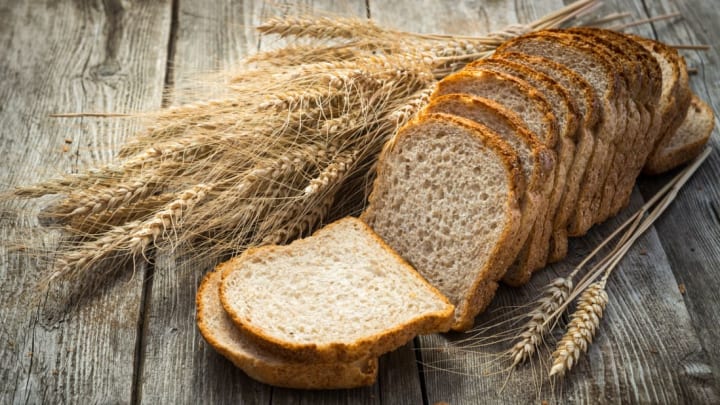Around 1928, a Missouri jeweler named Otto F. Rohwedder invented the automatic bread-slicing machine and became the darling of American kitchens. Bakeries began advertising the pre-cut loaves as "the greatest forward step in the baking industry since bread was wrapped," prompting Americans to coin that immortal phrase: "The greatest thing since sliced bread."
But America's love of sliced bread wouldn't stop the government from later banning it.
Starting January 18, 1943—the midst of World War II—sliced bread was barred from American bakeries and homes. New baking regulations set by the Office of Price Administration had boosted flour prices, and the government wanted to prevent these costs from getting passed down to the consumer. By banning the use of expensive bread-slicing machines, the government was hoping bakeries could keep their prices low. Officials were also worried about the country's supply of wax paper—and sliced bread required twice as much paraffin wrapping as an unsliced loaf. (It prevented the slices from drying prematurely.)
The decision was extremely unpopular. On January 26, Sue Forrester of Fairfield, Connecticut wrote a letter to the editor of The New York Times complaining on behalf of the country’s housewives [PDF]. "I should like to let you know how important sliced bread is to the morale and saneness of a household," Forrester wrote, saying she was forced to hand-cut more than 30 slices of bread every day for her family. It was a waste of American time and energy, she argued. It was also a waste of money: A good bread knife was difficult to find, let alone afford, during the war.
The rule was so disliked that nobody in the government apparently wanted to confess to having the idea. The ban was ordered by Food Administrator Claude R. Wickard, but the office of Price Administration blamed the idea on the agricultural department, which blamed the baking industry.
"The 'off-again-on-again' ban on sliced bread today has all the earmarks of a bureaucratic thriller," Illinois's Belvidere Daily Republican reported. "The mystery over 'whodunnit' in the first place is surprised only by the confusion in high places and the pointing of fingers at the next guy or any one within pointing distance."
The rule also apparently took everybody by surprise. (Or, as the Daily Republican put it, "[B]akers were caught with their wrappers down, so to speak.") According to the Chicago Tribune, "[T]he governmental ban on the sale of sliced bread, effective yesterday, caught hundreds of Chicago housewives by surprise and sent them scurrying to hardware stores to raid depleted supplies of bread knives."
The ban applied to everybody except hotels, restaurants, and railroad dining cars, which were awarded a 60-day reprieve to prepare. Bakeries that refused to abide by the regulation and continued using their bread slicers faced steep fines. The New York Area Supervisor of the Food Distribution Administration, John F. Conaboy, warned bakeries that the government was "prepared to take stern measures if necessary."
But even the law's biggest proponents couldn't seem to get behind it. Emil Fink, a prominent baker and member of the New York City Bakers Advisory Committee, pushed hard for the bread-slicing ban. But one year later, Fink was in court—for slicing bread. According to The New York Times, a U.S. Attorney chastised the bakery-owner: "[Fink] called upon the Government to enforce the regulation rigidly and, at that very time, his bakery was violating the law." Fink was fined $1000.
According to a February 1943 report in the Harrisburg Telegraph, the ban wasn't even saving money—in fact, bakers in the area saw sales drop as much as 5 or 10 percent. "While all bakers have varied reasons for the prevailing decrease, they all agree that the absence of sliced bread is at least playing some part in the drop," the paper reported.
Not only did the rule fail to save money, it didn't even save that much wax paper. On March 8, 1943, the ban was rescinded, prompting jubilant headlines across the country. As The New York Times trumpeted: "Sliced Bread Put Back on Sale; Housewives' Thumbs Safe Again."
